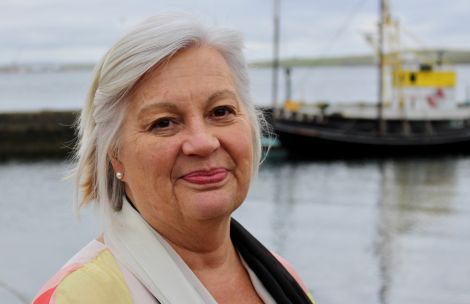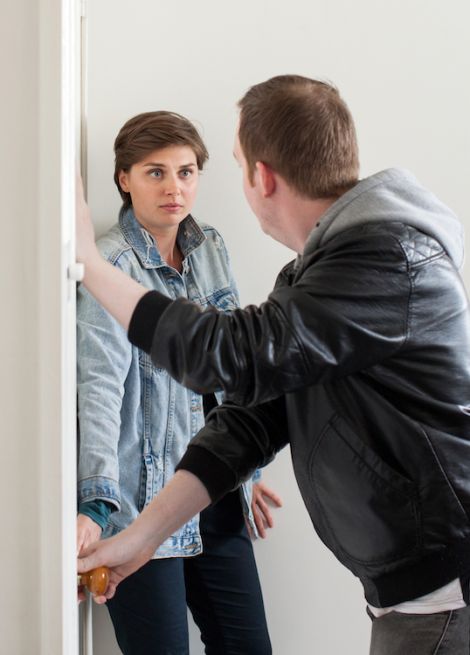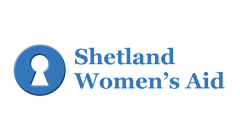News / Domestic abuse conference provides ‘opportunity for change’
THE CHIEF executive of Scottish Women’s Aid says over 100 people attending a conference in Lerwick on domestic abuse is an “extraordinary testament” to the respect in which local services are held.
Dr Marsha Scott spoke at the Shetland Women’s Aid event, which was held at the Shetland Museum on Tuesday, to provide an update on Scotland’s new domestic abuse law which came into force in April.
“It’s quite unusual for Shetland to do a conference of this scale, and the fact that there’s over 100 people coming is an extraordinary testament to the respect with which they [Shetland Women’s Aid] are held, to the opportunity to change things in Shetland,” she said on Monday.
“It’s probably bigger than our opportunities in many other larger communities. And also I think it’s a little bit of a comment on the fact that Shetland knows it’s got a problem.”
The new Domestic Abuse Act criminalises psychological domestic abuse and controlling behaviour and it includes a sentencing aggravation to reflect the harm that can be caused to children growing up in an environment where domestic abuse takes place.
Scott hailed the legislation as the “world’s new gold standard” when it comes to prosecuting domestic abuse.
“It is really amazing how much difference it could make, and now the question is are we going to do our job across all of the systems to take advantage of that,” she said.
Shetland Women’s Aid had to temporarily close off its waiting list last year as its struggled to cope with demand before a lottery grant gave the organisation time to restructure.
Become a member of Shetland News
The charity offers counselling, advice and support and refuge accommodation to women and their children who are being or have been physically, emotionally or sexually abused.
Scott acknowledged that someone disclosing domestic abuse in a small island community can add even more pressure to an already difficult situation.
But she said close-knit communities can provide levels of support which cities can often not.
“Small communities are both a challenge and an opportunity,” Scott said.
“Women are really nervous often, they tell us, about disclosing in a place where the person they have to disclose to knows her or knows her ex-partner or her partner, and it’s not just nerves because of the stigma – there’s still a lot of stigma for victims of domestic abuse – but it’s also because sadly we know that the wheels of justice don’t always turn fairly when people who are friends or relatives of a perpetrator are in them.
“The flip side of that is in small communities people come together and can be an extraordinary source of resilience and protection.
“The other issue I think is that we have problems of scale sometimes. I was talking someone in a meeting this morning who works for the council in social work, and she has such a small team, after cuts after cuts. Yes, there’s smaller numbers, but at the end of the day you can’t have a half of a social worker. So I think the investment sometimes needs to be more per capita.”
Scott added that the issue is “everybody’s responsibility” – not just Women’s Aid and the police.
She said housing officers, social workers and health workers “need to go back and say if I were a woman or child experiencing domestic abuse, and I were in your case load, how would I feel about it?”
“Would I feel safe? Would I feel able to disclose? Would you be able to signpost me to the right services? And the answer that I suspect is sometimes yes,” Scott said.
Another issue in terms of people feeling uncomfortable disclosing domestic abuse they have experienced is having their case reported on by the media when it is heard in court.
This double-edged sword in small communities allows the public to know domestic abuse crimes are being prosecuted, but it can leave victims feeling exposed.
“The media has huge responsibilities, and in our experience, some are really, really good and some are not,” Scott said.
“There’s been some issues in Shetland a few years ago which I recall, which were from a national outlet, not a local. What we find frustrating is so often media reports, television and national newspapers – they go for the big headline rather than the truth.”
She said Women’s Aid is “really tired of people connecting domestic abuse always with a physical assault, and also pictures that portray survivors as beaten and vulnerable and weak”.
“We’re all that sometimes, but the reality is that just as often they resist and they’re strong and they’re angry and they’ve been desperately trying to get somebody to help them for a long time,” she continued.
“The media has a huge responsibility for getting the word out appropriately that doesn’t restigmatise people. I think we have a long way to go. But also there’s whole idea of you can’t tell a domestic abuse story without having a victim.”
For advice or help on domestic abuse, contact Scotland’s Domestic Abuse and Forced Marriage Helpline on 0800 027 1234 or Shetland Women’s Aid on 01595 692070.
Become a member of Shetland News
Shetland News is asking its readers to consider paying for membership to get additional perks:
- Removal of third-party ads;
- Bookmark posts to read later;
- Exclusive curated weekly newsletter;
- Hide membership messages;
- Comments open for discussion.
If you appreciate what we do and feel strongly about impartial local journalism, then please become a member of Shetland News by either making a single payment, or setting up a monthly, quarterly or yearly subscription.











































































